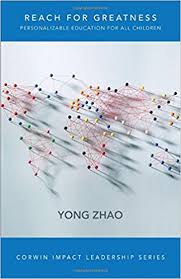Yong Zhao, University of Kansas Professor of education, has published over 30 books, including a few reviewed here at Learning and the Brain about the importance of entrepreneurship and creativity for producing a well-educated citizenry, even though the educational culture is test-obsessed and is increasingly standardizing procedures. In his newest book, Reach for Greatness: Personalizable Education for All Children, Zhao revisits these important themes and emphasizes the need for an educational shift away from trying to mend students’ deficits and towards supporting students’ strengths and passions.
One problem with our current educational model is the expectation that all students will gain roughly the same skills and knowledge at roughly the same pace. We measure extensively whether this is happening. In spite of extensive efforts to regiment and assess student learning, certain groups continue to systematically receive lower quality education and all students’ are exposed to an educational system that is not focusing on real learning. Zhao calls for a dramatic shift towards developing students’ strengths and interests, ceasing to fix students’ weaknesses, and supporting the development of a broader range of skills, especially creative and entrepreneurial skills.
It is rare for students to be rewarded in school for their passion. Students are rewarded for being well-behaved and competent, regardless of what they are learning or how they feel about it. Our meritocratic educational system determines each students’ merit relative to other students’ ability on a narrow set of skills. Since not all students can be the best at those few skills, many are held to low expectations. These expectations can be damaging, and those who hold them ignore the fact that while not all students will be outstanding at everything, all students can learn and can be great at something. Students have “jagged profiles”. That is, there are a myriad of human qualities, and each student excels at some unique combination of those qualities. Each student has his or her own set of strengths, interests, experiences, and relations, and this diversity is what can allow each student to be great in his or her own way.
Indeed, it is natural for people to need to feel as though they are great and to be able to realize their full potential. In fact, the more the need to feel great is met the more it grows. Focusing on and developing that which is unique about each student can satisfy each students’ need for greatness.
Zhao calls for “personalizable education.” He explains how we can bring it about—by focuses on enhancing students’ strengths, developing the broad spectrum of human talents that are important for our changing economy, and capitalizing on students’ motivation to contribute to the world. Personalizable education is premised on the idea that students can organize their own learning. To implement it schools need to give students substantial agency over how they spend their time, allow for shared governance among administrators, teachers, and students, create a culture that believes change and flexibility are good, and encourage students to engage in authentic work where they make a contribution.Notably, personalizable education is substantially different from personalized learning, which, paradoxically, does not give students control over what they learn and focuses on fixing what students have not learned well-enough.
Realizing personalizable education will require governments to move away from telling educators what and when students should be taught. Instead, governments should focus on providing adequate and equitable funding as well as investing in educational innovation. Business should stop profiting from counter-productive “personalized learning” tools and instead lead the charge to move schools towards personalizable education. Parents and the public too should advocate for personalizable education.
Higher education institutions can help bring about personalizable education by changing admission standards to value diverse skills and by making the higher education experience itself more personalizable to prepare students for the workforce. Finally, educators are key to bringing in an era of personalizable education, but the current model of treating teachers as merely the deliverers of content, rather than the co-constructs and guiders of sophisticated learning needs to change. Personalizable education will require educators to develop the ability to identify students’ strengths and passions, inspire change in students, show empathy towards students, have a broad/long-term perspective on education, demonstrate management and leadership skills, and demonstrate resourcefulness and collaboration in shaping students learning. With action from each of these stakeholders we can help all students’ realize their greatness and create more fulfilling and useful educational experiences.
Zhao, Y. (2018). Reach for greatness: Personalizable education for all children. Thousand Oaks, CA: Corwin Press.




